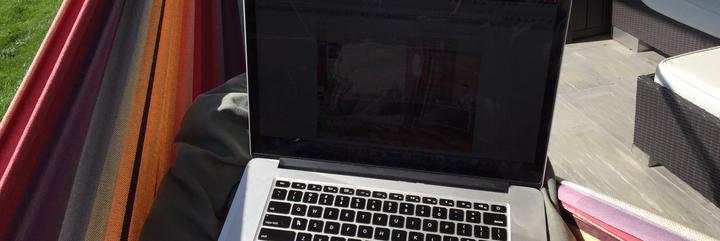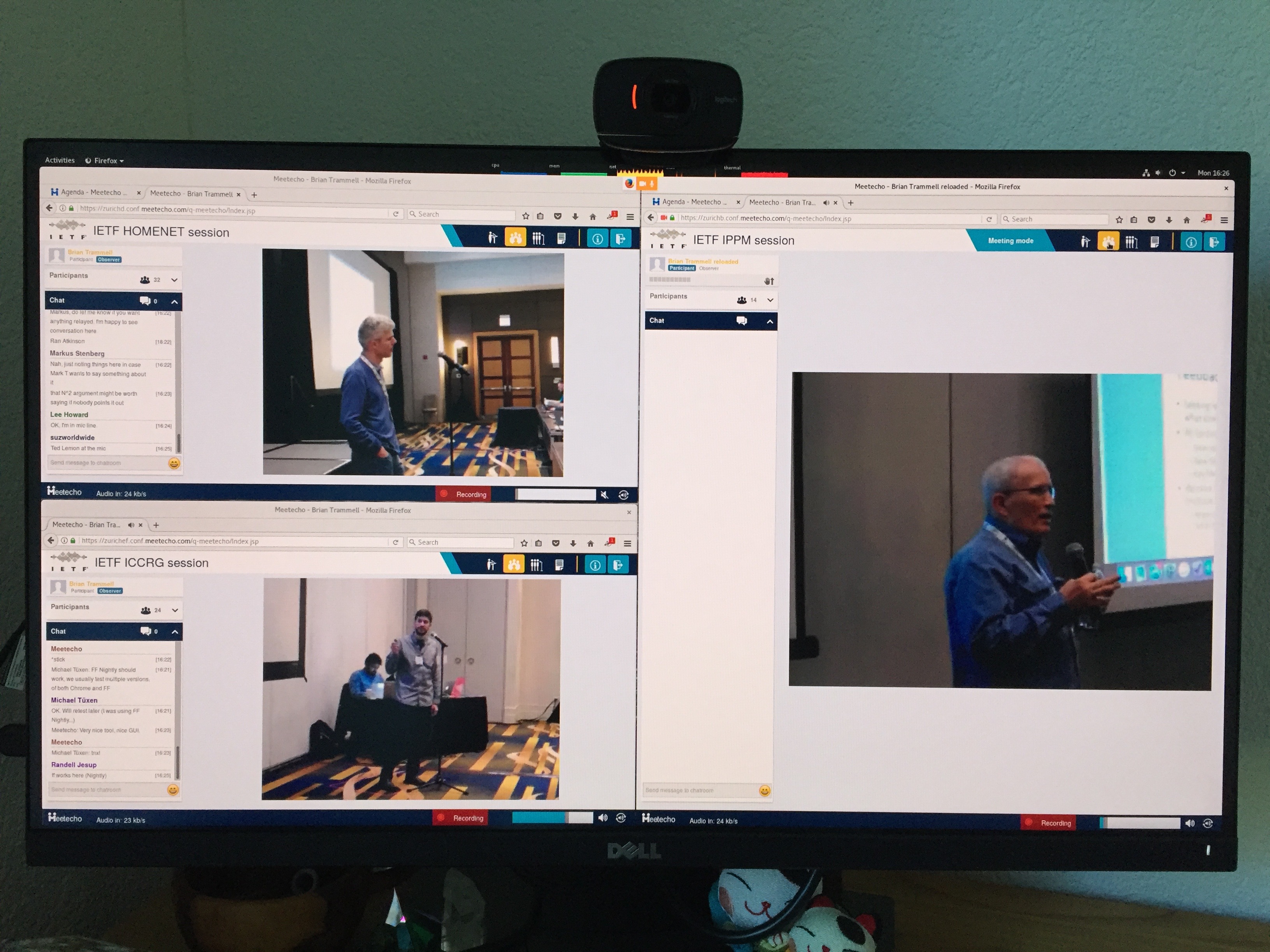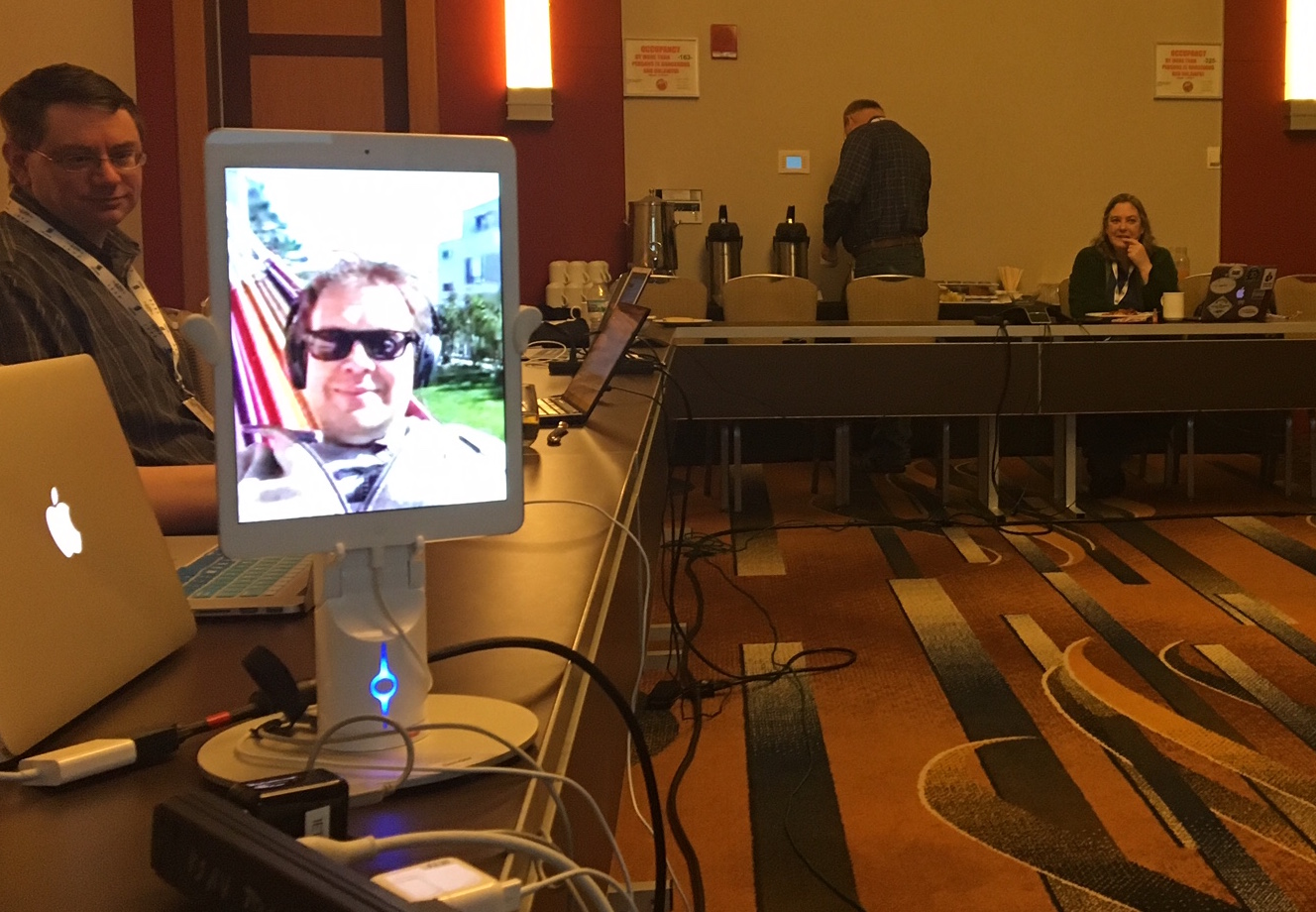Live, via Internet, from the hammock

Internet architecture and Internet-centered research being a global enterprise, I spend between four and seven weeks a year on the road, depending on which year, your definition of road and your definition of week, and a fair amount of time in teleconferences in various timezones in the time in between. One of the fixtures in my calendar is the thrice-annual meeting of the Internet Engineering Task Force (IETF), taking place right now in Chicago. I’ve only missed three such meetings in the past dozen years, and each time I do I attempt to take part via Internet as best I can. Here are my reflections about well it’s working this time around, how it’s improved, and how it could improve further. For in a world where those who steadfastly believe in borders and walls seem to be gaining the upper hand, it seems prudent to prepare to do the work of Internet architecture, engineering, and standardization without the benefit of free movement of the people doing it.
First, the technical: I’ve been using MeetEcho to attend the working group sessions, and a combination of a Revolve Robotics Kubi foe video and Cisco’s Webex for audio, bridged to whatever early-aughts era teleconferencing phone it’s plugged into, for the IAB sessions. I’ve been doing this on a few-years-old Macbook Pro (because I’ve been a fanboi since I got my Apple IIgs in ‘87) and a newish Linux box (to see how well it works).

The good: Meetecho Just Works on Firefox on Mac and Linux. a testament to the hard work of the Meetecho crew on site, the engineering of the product, and the WebRTC technology it’s based on. It even Just Works if you’re running three meeting streams at once, presuming your Internet connection can handle it.
The bad: Webex on Linux is a screaming nightmare, because Java, so I gave up and have been running the Kubi stream either on Linux or one Firefox tab on the Mac, and the Webex app on the Mac regardless. All of the standard complaints about conference-room phones placed ad-hoc in biggish conference rooms apply as well.
The Kubi is cute, in that it lets you point an iPad around the room so you can “look” at who’s talking, and everyone in the room has a point of reference for “where Brian is”, but the controls are not great for swinging around the room quickly, and I’ve spent a bit too much time feeling uncomfortably close to whoever happens to be sitting next to the thing. I’m not sure whether this is an execution thing, or just a fundamental problem with telepresence-via-iPad-on-a-stick, but I’m not sure it’s a significant improvement from a laptop in a corner or the Voice from the Heavens, for the remote participant at least.

None of the technology fixes the fundamental problem of timezones, though, and attending a meeting in Chicago from Zürich kind of destroys the evenings, and while I can nudge my clock toward Central Daylight Time, my family doesn’t. Having jet lag at home is a little weird. Dinner last night had a distinct F1 pit-stop feeling to it, as I raced through it in a few-mintes break between two meetings1.
And as for that Experience: Attending via Meetecho from the comfort of your own home and hammock is vastly superior to having to run between rooms in a conference center in order to wedge yourself into the Standard Issue Hotel Conference Center Chair. For actually tracking what’s going on in the meetings, and even for interactive discussion at the mic via the remote queue, it’s basically as good as being there, especially in standing-room only rooms. The audio is usually good, the seating is way more comfortable, and there’s no need to complain about the temperature2. The experience this time was smooth enough that I would even consider remote charing via MeetEcho, should I need to miss another meeting.
But the important part of the IETF, for me, isn’t the working group meetings: the serendipitous meetings in the hallway between them are generally more productive3 than the working group meetings themselves, the informal time is important to catch up with colleagues and friends I see only three times a year, and the frantic energy of the place is missing on my balcony. Until we find a way to replace that, a post-airline IETF remains firmly in the future.
1 On further thought, this does kind of feel like the afternoon cookie scrum at the IETF, so I guess it’s part of the Experience.
2 Unless, of course, you live in an unheated / uncooled house in a region where heating/cooling is necessary, but that’s hardly the IETF’s fault.
3 In the sense that they lead to more interesting work, which admittedly may not be the lowest-stress definition of “productive”.